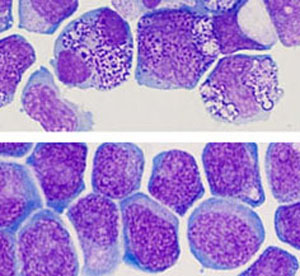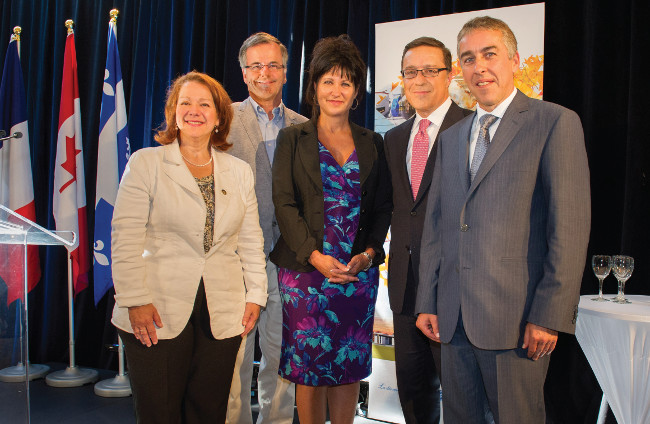
The Institute for Research in Immunology and Cancer (IRIC) at the Université de Montréal (UdeM), in collaboration with the Maisonneuve-Rosemont Hospital’s Quebec Leukemia Cell Bank, recently achieved a significant breakthrough thanks to the laboratory growth of leukemic stem cells, which will speed up the development of new cancer drugs.
In a recent study published in Nature Methods, the scientists involved describe how they succeeded in identifying two new chemical compounds that allow to maintain leukemic stem cells in culture when these are grown outside the body.
This important advance opens the way to the identification of new cancer drugs to fight acute myeloid leukemia, one of the most aggressive forms of blood cancer.
The ability to grow leukemic stem cells in culture is a major breakthrough. The next step is to study the molecular mechanisms that regulate the survival and proliferation of leukemic cells as well as the resistance to cancer drugs.
This study is the work of the “Leucégène” research group. This group is co-directed by Dr. Guy Sauvageau, chief executive officer and principal investigator at IRIC as well as professor in the Department of Medicine at the UdeM; by Dr. Josée Hébert, director of the Quebec Leukemia Cell Bank, hematologist at Maisonneuve-Rosemont Hospital and professor in the Department of Medicine at the UdeM; and by Sébastien Lemieux, principal investigator at IRIC. The first author of the study is Caroline Pabst, a postdoctoral fellow at IRIC and associate of the “Leucégène” research group.
“This research breakthrough demonstrates the advantage of working in a multidisciplinary team like the ‘Leucégène’ research group,” stated Drs. Sauvageau and Hébert. “Access to cells of leukemia patients and to IRIC’s state-of-the-art facilities are also key factors in pursuing ground-breaking research.”
Background to the study
Stem cells located in the bone marrow are responsible for the production of blood cells. Unfortunately, deregulation of those cells often produces disastrous consequences when one of them develops mutations that transform it into a malignant cell called “leukemic”. The result is an abnormal proliferation of blood cells and the development of leukemia. Leukemic stem cells are also one of the likely causes of patient relapse because they are especially resistant to cancer treatments.
The major obstacle before this discovery was growing stem cells and keeping them intact in vitro, because they quickly lost their cancer stem cell character. As a result, it was very difficult to effectively study the multiplication of cells that cause leukemia.
To get around that difficulty, the team of researchers studied leukemic stem cells from patients with acute myeloid leukemia, obtained from the Quebec Leukemia Cell Bank. After thousands of tests using various chemicals, they identified two new chemical compounds that, when added to the culture medium, can keep functional human leukemic stem cells alive for at least seven days in vitro.
“Leucégène” research group
Made up of researchers from the Université de Montréal, the Université Laval and McGill University, the “Leucégène” research group is concerned with the identification of the genes and the factors that determine the chances of recovery from acute myeloid leukemia, and with the discovery of new therapies for this cancer.
Funding for this research project
This research project was financed by grants from Genome Quebec and Genome Canada, the Cancer Research Network of the Fonds de recherche du Québec – Santé, Canada Research Chair in Molecular Genetics of Stem Cells, Research Chair in Leukemia, supported by Industrielle-Alliance (Université de Montréal), the German Cancer Aid (Deutsche Krebshilfe) as well as the Cole Foundation.
]]>
Servier Canada, the Canadian subsidiary of the Servier Research Group, with the support of Montréal International (MI), Laval Technopole, the Biotech City, Montréal InVivo and Investissement Québec are together committing $16.3 million to construct a new Centre of Excellence in Clinical Research into cardiovascular disease, cancer and neuropsychiatry in Laval, QC.
The announcement was made in the presence of Nicolas Marceau, Québec Minister of Finance and the Economy, who confirmed the awarding of a $1-million nonrefundable financial contribution to launch the project. The new 30,000 square-foot complex will enable the company to hire forty or so new employees over the next few months.
“The Servier Research Group, the second largest French pharmaceutical company, decided to bolster its research endeavours in Canada, particularly in Québec, since the level of excellence in the research sector make it an ideal location to advance therapeutic innovation,” stated Emmanuel Canet, president of Servier R&D.
“Health is a priority issue. Our mission is to make available to the medical profession and Canadian patients the best possible therapeutic solutions. In order to achieve this, we must not only bolster our research efforts, but also benefit from a health policy that supports innovation,” added Frédéric Fasano, CEO of Servier Canada.
The Biotech City, site of the new centre of clinical research, is already home to a university (INRS), research laboratories, a business incubator and major biotechnology and biopharmaceutical companies.
“We have supported this leading Biotech City company throughout the entire project. Servier Canada is part of a dynamic business centre that houses, within a four-kilometre radius, basic research, clinical trials, production and marketing,” commented Pierre Desroches, president and executive director of Laval Technopole and the Biotech City of Laval.
The centre will house activities for the Canadian International Centre for Therapeutic Research (ICTR) and the Servier Canada National Centre for Professional Training. Its mandate will be to help further the design and development of ICTR clinical research in major therapeutic areas including cardiovascular disease, cancer and neuropsychiatry.
]]>